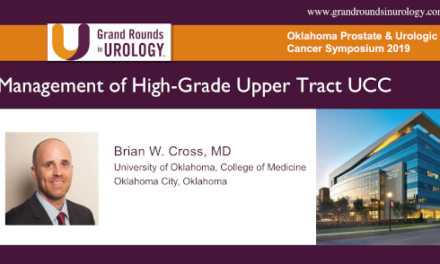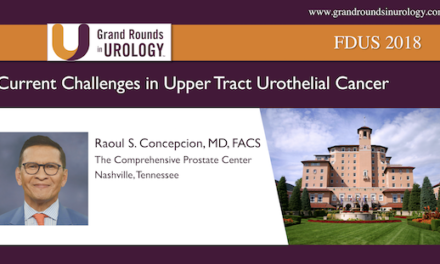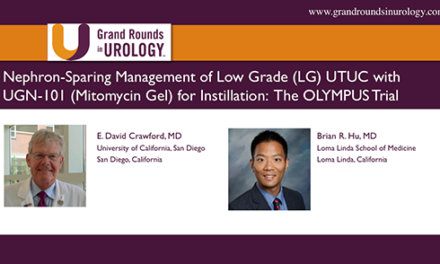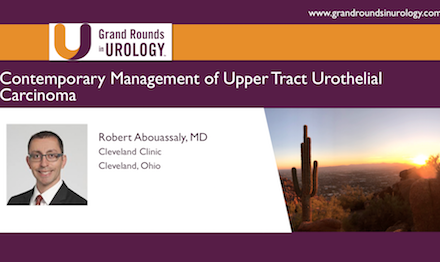Surena F. Matin, MD, presented “Mitomycin Gel (UGN-101) Approved for Treating Low-Grade Upper Tract Urothelial Carcinoma: The OLYMPUS Trial” for the Grand Rounds in Urology audience in April, 2020.
How to cite: Matin, Surena F. “Mitomycin Gel (UGN-101) Approved for Treating Low-Grade Upper Tract Urothelial Carcinoma: The OLYMPUS Trial” April, 2020. Accessed Jul 2024. https://grandroundsinurology.com/mitomycin-gel-ugn-101-approved-for-treating-low-grade-upper-tract-urothelial-carcinoma-the-olympus-trial/
Mitomycin Gel (UGN-101) Approved for Treating Low-Grade Upper Tract Urothelial Carcinoma: The OLYMPUS Trial – Summary:
Correction by Dr. Matin: Jelmyto is considered a drug, not a drug device as stated in this video.
Surena F. Matin, MD, Professor in the Department of Urology at MD Anderson Cancer Center in Houston, Texas, discusses the OLYMPUS Trial which studied the effects of mitomycin gel (UGN-101) in treating low-grade upper tract urothelial carcinoma. The FDA has recently approved this drug for treatment after the trial’s successful results. Prior to approval, there was no method of treatment that allowed for topical therapies in upper-tract cancer cases like there is for the bladder, and there had been little research into potential treatments. Dr. Matin was an investigator on the trial and discusses the selection of participants, the procedures of the trial, and the conclusions that were drawn. He highlights that during the trial, 58% of participants had a complete response, and that fully optimizing the drug plays an important role in those high numbers of success. He also discusses some of the adverse events that occurred during the trial and considerations for using mitomycin gel as a treatment.
For more information on upper tract urothelial carcinoma, please visit our Next-Generation Learning Center on this topic.
ABOUT THE AUTHOR
Dr. Matin received a BS in Biology and Minor in English from Old Dominion University on a full academic scholarship, and attended medical school in New York City at the Cornell University Medical College, now known as the Weill Cornell Medical College. After receiving his M.D., he completed residency in Urology at Cleveland Clinic Foundation, and subsequently stayed for a 1-year research fellowship with a scholarship from the American Foundation of Urologic Disease, followed by a clinical fellowship in Endourology and Minimally Invasive Surgery under the mentorship of Drs. Inderbir Gill, Stevan Streem, and Andrew Novick.
Dr. Matin is currently the Monteleone Family Foundation Distinguished Professor with Tenure in the Department of Urology at MD Anderson Cancer Center, Houston, Texas. He also serves as Medical Director of the MINTOS (Minimally Invasive New Technology in Oncologic Surgery ) multidisciplinary collaborative program in the Division of Surgery, which administers the robotic surgery program and has provided free-of-charge, multidisciplinary surgical education to MD Anderson surgery trainees at no cost to the institution since 2006. Dr. Matin has an active clinical practice focusing on the entire spectrum of care for renal cell carcinoma (RCC) and upper urinary tract urothelial cancer (UTUC), ranging from surveillance, endoscopic, laparoscopic, robotic, open and salvage operations for localized and metastatic disease, as well as minimally invasive treatment of adrenal tumors. Dr. Matin has one of the largest UTUC practices in the country. His primary research efforts are based on genomic characterization of UTUC and multiple other lines of research seeking to shed light on this rare cancer, along with clinical research in UTUC and RCC. He actively collaborates with other clinicians, pathologists, radiologists, translational scientists and basic scientists as can be seen in his selected publications.




